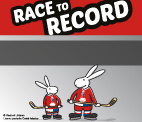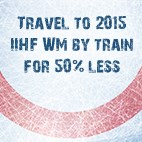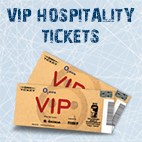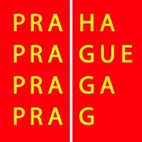Home Championships
Home Championships
How well do teams play in front of the home crowd?

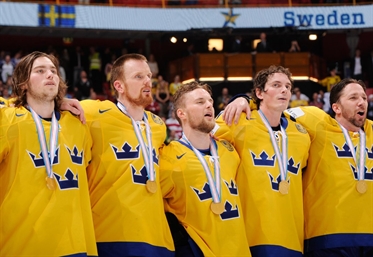 Winning at home is beautiful: Sweden broke the home-ice curse after 27 years by winning the 2013 IIHF Ice Hockey World Championship on home ice in Stockholm. Photo: Richard Wolowicz / HHOF-IIHF Images
Winning at home is beautiful: Sweden broke the home-ice curse after 27 years by winning the 2013 IIHF Ice Hockey World Championship on home ice in Stockholm. Photo: Richard Wolowicz / HHOF-IIHF Images
The IIHF Ice Hockey World Championship is a tournament that attracts lots of fans. Usually, strong attendance depends on a strong showing from the host team. If they bow out in the quarter-finals or earlier, it can negatively impact local interest, and how successful the tournament is. After 1986 and before 2013, in the 26 tournaments not a single host nation won gold despite some very strong teams that could have, and in some cases should have, won.
The year after Czechoslovakia won on home ice in 1985, the World Championship moved to the Soviet Union. Viktor Tikhonov’s team had a clear goal – to make up for their failure the previous year and regain the world title on home ice in Moscow. And with one of the strongest rosters they've ever assembled, the Soviets won all 10 games, easily becoming World Champions once again. To show how truly dominant they were, Vyacheslav Fetisov, Alexei Kasatonov, Vladimir Krutov, Igor Larionov and Sergei Makarov – five players, the famed “Green Unit” – were named to the tournament All-Star Team. It was a truly spectacular home-ice performance, but it would be the last time the home team would win for many years.
One of the reasons this happened was that more nations became interested in hosting the World Championship. In an attempt to expand interest outside of Europe's traditional four hockey powers of that time, other countries such as Germany, Switzerland, Austria, Italy and Norway hosted the tournament – some of them multiple times, but none of them were seriously expected to contend for the gold medal. Still, some countries were favoured to win at home and failed for a variety of reasons.
Continue readingIn 1995, the World Championship was held in Sweden. Despite finishing in third place in Group B, Tre Kronor did quite nicely in the playoff round, starting with an easy 7–0 quarter-final win over Italy. Up next was a tough semi-final encounter with Canada, but the Swedes prevailed in overtime, setting up a final against Finland – a team that had never won the gold medal. However, Suomi finally managed to win the trophy after two earlier losses in gold medal games and a silver medal from the Calgary Olympics. The team filled with stars beat their Nordic rivals 4–1 in front of the opponent’s home fans. It was a time for the Finns to rejoice, but their first gold medal would be their last for many years.
In 2000, Russia hosted the World Championship for the first time since 1986 and no team had been as highly-touted to win on home ice since, with a team featuring stars such as Pavel Bure and Alexei Yashin. However, poor chemistry on and off the ice among the NHL stars, poor play from both goalies and frustration on the part of players from the domestic league who got little ice time led to some shocking losses against Switzerland, the USA, Latvia and Belarus and an embarrassing 11th-place finish – their worst ever.
The World Championship returned to the Nordic countries in 2002 and 2003. The Swedes hosted the first one and seemed unbeatable, but surprisingly lost to Slovakia in the preliminary round. The teams met again in the semi-finals and, even though Sweden was up 2–0 and seemingly on their way to the final, the Slovaks woke up and came back tie the game. It was eventually decided in a shootout, where the Swedes just couldn't beat Jan Lasak. The Slovaks would go on to win their first-ever gold medal, while the Swedes had to settle for bronze.
One year later, it was the Finns' turn to take a shot at breaking the curse. Finland finished second in 1998, 1999 and 2001, but that was supposed to change at Hartwall Areena. However, the team built around Teemu Selanne, Saku Koivu and Olli Jokinen stumbled in the qualification round, meaning they drew their old nemesis, Sweden, as a quarter-final opponent. In the annals of classic Sweden–Finland games, that was a game that fans of neither team will ever forget, as the Finns were ahead 5–1 in the second period and already looking ahead to the semi-finals, but three quick goals made it a one-goal game before second intermission. In the third, Peter Forsberg tied it with his second goal of the game and P.J. Axelsson scored the winner. The shocked Finnish fans could not believe what they'd seen when the game was over, as their team was finished.
In 2004, the Czech Republic got the opportunity to host Worlds. Players made a special effort to play at home, and Jaromir Jagr participated only for his fourth time ever. Through the first six games, the Czechs were flawless, punctuated by a 6–2 thrashing of Canada in the final game before the knockout stage. Their quarter-final against the USA started well as the Czechs went up 2–0 up, but the Americans came back and sent the game to overtime, then a shootout. In the fifth round, Andy Roach scored the decisive goal to kill dreams of many locals, and to keep the home-team curse alive and well.
Three years later, Russia had a chance to make up for the last home Championship and it was truly a much better team that presented itself in newly built arenas in Moscow and Mytishi. Once again there were stars – this time Yevgeni Malkin, Ilya Kovalchuk and Alexander Ovechkin – but this time they played as a cohesive unit under coach Bykov, the all-star defenceman from the '86 squad. However, after seven straight wins, they eventually dropped a game. Unfortunately, it was in the semi-finals, against the pesky Finns, who always seem to play the roles of giant killers at this stage of the tournament. Mikko Koivu’s overtime-winner sent the Finns into the final, leaving nothing for the Russians except bronze.
A year later, Canada hosted the World Championship for the first time in history. The tournament had always been overshadowed in the birthplace of hockey as it clashed with the Stanley Cup playoffs, but as defending champions, the Canadians were geared up with a team that included Dany Heatley, Rick Nash and Martin St-Louis to repeat on home ice and be the ones to break the curse. The Canadians encountered few problems until they met Sweden in the semi-finals, but won a tough game 5–4 to advance to the final. Halfway through the final game, it seemed the curse would end after all, as Canada took a 4–2 lead, but a pair of Russian goals sent the game to overtime where Kovalchuk scored his second goal of the game on the power play to end it. For the Russians, it was a curse of a different kind that ended that day, as they celebrated their first gold medal in 15 years, but the home-ice curse continued.
In 2012 and 2013, the Swedes and Finns once again hosted back-to-back World Championships, this time even as co-hosts in both years. The Finns made it to the semi-finals in Helsinki in '12 where they lost to the eventual gold medalists from Russia, but the Swedes made it right to the gold medal game the following year in Stockholm, knocking off the Finns in the semi-finals. The last team standing in their way was an unlikely Swiss squad, which had last won a medal 60 years earlier but had captured the hearts of the hockey world with their inspired tournament and having won all games prior to the final. However, their Cinderella ride ran out of magic, and the Swedes were strong, particularly the play of Jhonas Enroth in goal and the Sedin twins, Daniel and Henrik, up front. Sweden won 5–1, becoming the first team in 27 long years to celebrate the World Championship on home ice.
With the curse now broken, what does that mean for future teams who host the World Championships? How will the Czechs fare in front of their home fans this year?
Back to Overview





















































